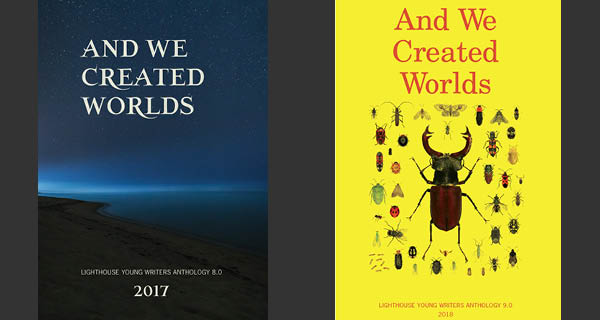
Editor's Note: Young writers in grades 3-12 who've taken a Lighthouse workshop (either in-house, online, or off-site) are welcome to submit to our annual anthology, And We Created Worlds, here until September 1.
Walking past all the couples outside Thornton High that first day, my first day of teaching creative writing in Colorado, I was a little shocked. Teens were smooching freely in full view of everyone, bodies close, arms and legs annealed, pheromones perfuming the air. High school, I’d almost forgotten.
For about ten years I helped these hormone-driven kids harness this wild energy into words and stories more powerfully than they would have without my guidance. I think I helped them mature in writing and thinking and reasoning. At least that’s what I dream I did.
Maybe I did no such thing. Many writers insist you cannot teach anyone to write. You can encourage, provide techniques, offer challenges, but you cannot teach the art. I tried to give these remarkable students confidence in their own voice, wide berth to express themselves, stimulating prompts and pieces of fiction and prose poetry to read. I did not censor their work, although when submitting for publication or public readings, we often had to tone down their vocabulary. We experimented with poetry, fiction, creative nonfiction, personal essay, hybrid forms, and mosaic composition. I worked in English classrooms and taught a “master class” in creative writing after school for several years. When Lighthouse began publishing And We Created Worlds, Thornton students were well represented.
Many students wrote about vampires, science fiction, horror, and fantasy. They were often overloaded with homework, sports, clubs, jobs, music, and a lot of family care. Many had social issues, family poverty, instability, while others lived with serious secrets they sometimes shared with me and even wrote about, which I believe helped.
There were several students each year who remain close to my heart. The quiet senior who consistently wrote World War II air battles in such detail he put the reader in the cockpit. My rule was if you were working on a longer piece at home you could use my prompt to continue that, so he wrote battles throughout the year. Lighthouse asked for a student to read aloud and I offered it to him. He agreed and we worked on his presentation over the phone. He gave a marvelous reading. A week later various Thornton teachers told me he had never spoken aloud in a classroom in all four years.
A Sudanese freshman wrote of her family’s flight from attackers in her homeland. Her father had been jailed and her mother, brothers and sisters walked for over a month, night and day, through tall grass and jungle with little food or water to eventual safety. It was a harrowing tale, yet the girl was strong, full of beauty and joy. She told the story with such grace and gratitude, and no bitterness, it humbled me.
Many of the young writers have incredibly gifted imaginations in addition to radical intelligence. One junior wrote a contemporary riff akin to Chaucer’s Canterbury Tales: a flight from Denver to LA with eclectic passengers who rapped their stories. She submitted it to the Faulkner national competition and was a finalist.
Another year, one Thornton junior wrote a kick-ass mystery/sci-fi piece which she read at a Lighthouse faculty/student venue that brought the house down.
This year a young woman’s piece about love was so true and fresh it made me, cynical me, weep in class in front of everyone. It was innocent and beyond beautiful.
I have been lucky to be in the presence of so many gifted and talented teens with fabulous senses of humor, great, burgeoning intelligences, remarkable stories and hearts that glow. They share their pieces and are kind and encouraging to one another in ways that astound and hearten me. I am enlivened each time I teach, inspired by their honesty, eagerness to teach me their world and words, to play, to learn. They willingly share their grief and loneliness and heartbreak, their rage and fears, hopes and desires. I am eternally smarter and braver for knowing them.
Gail Waldstein, MD, practiced pediatric pathology for more than 35 years, writing numerous medical articles and book chapters, as well as teaching residents, fellows, and medical students. Poetry, stories, and essays have won numerous awards and her work appears in The Denver Post, 5280, Nimrod, New Letters, The MacGuffin, Carve, Bayou, The Potomac Review, Harpur Palate, Connecticut River Review, The Examined Life, Pearl, Zone 3, The Iowa Review, and numerous other journals and anthologies. She won first place in the William Faulkner/ William Wisdom poetry contest in 2013 and is the author of The Hauntings, which won the Swan Scythe Press chapbook contest in 2014.

